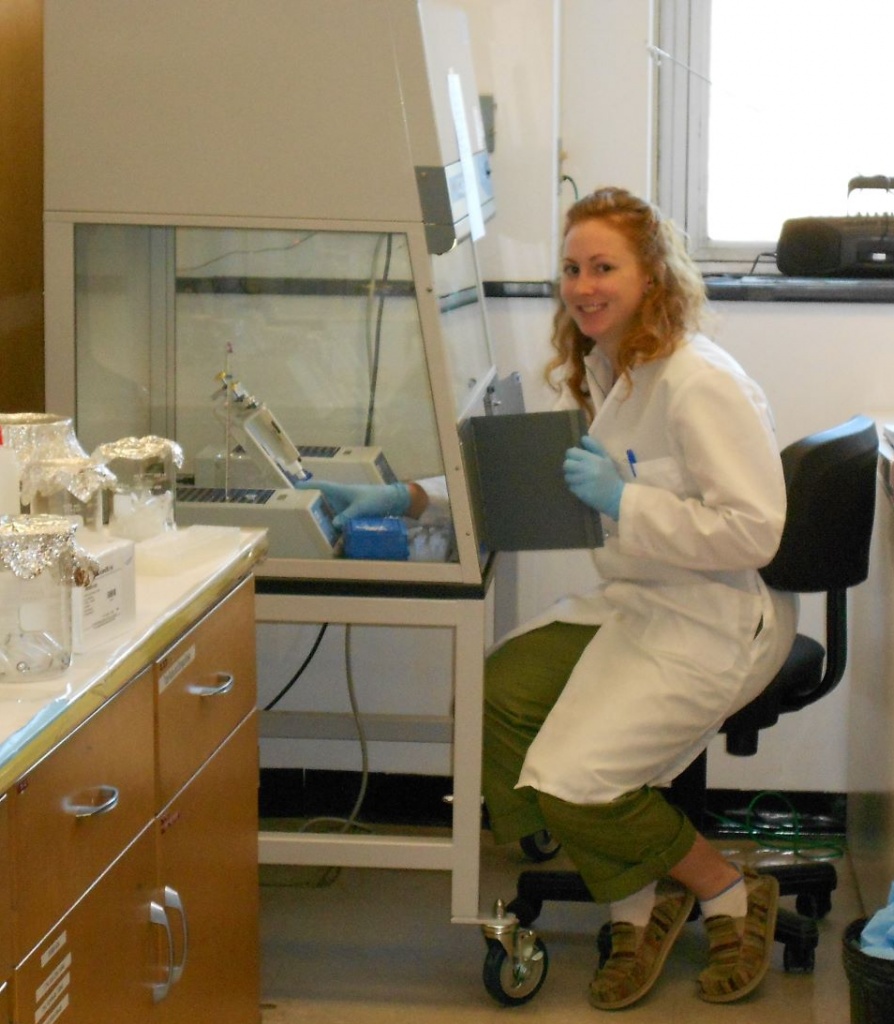M.S., Entomology, Penn State. B.S., Plant Biology, Michigan State University
Can you tell us a bit about your current job?
Anna: I am an Agronomy Educator with Penn State Extension covering a five-county region. One of the main parts of my job is working with farmers. I teach pesticide education and safety to help farmers earn their recertification credits to maintain their pesticide applicator licenses. I also support local farmers by answering questions about field and forage crop production. Whether they have a disease issue or need help with nutrient management, I answer calls and questions relating to any agronomy issue.
This is an academic position, so I write articles and work with my team on a field crop newsletter that goes out once a week. I also create videos, help with workshops and webinars, and lead field days. During the summer, I conduct on-farm research in collaboration with agronomy team specialists on Penn State’s campus.
People that come into the extension office ask a lot of interesting questions, so I am always learning something new. Recently, a horse owner wanted to renovate her pasture for bee-friendly plants and flowers that would also be safe for the horse to eat. I did not know if that was really possible, so I did some research and recommended adding a pollinator strip. Over the years I have given a lot of presentations in front of people. Usually I will try to put some insect jokes in, and usually the farmers don’t think they are funny. So you have to be able to laugh at yourself too!
What are some parts of your work that you find the most exciting or rewarding?
Anna: I would say the most exciting part of this job is the fieldwork during the growing season. I love being outside! We have been working from home for the past year since all of our extension offices are currently closed to the public. I am getting a little stir-crazy and ready to get outside, so it is even more exciting that field season is starting soon.
As far as rewarding goes, I would say working with the local farmers. They are all very kind, hard-working people, and they appreciate the help with different things. It is always a good feeling when you have been able to make a difference, and I have had farmers tell me that they can sleep better at night because I was able to help them with something on their farm.
In your work, are their things that the farmers teach you?
Anna: Definitely! I was a plant biology major at Michigan State University and then earned my master’s degree in entomology at Penn State, so I do not have a traditional agronomic crop background. I am always learning a lot from the local farmers, and it has been a great experience.
When you look back on your education and career, what are some things that helped you achieve this current position?
Anna: I took a unusual route to get to where I am today. When I first started college, I was interested in plant diseases because I liked microbiology, but then I switched over to plant biology and began working in the Malmstrom Lab. Over time, I realized that I was interested in insects and shifted to working more on the insect side of things in the lab and taking more entomology classes. The research experiences in the lab and field drew me to a master’s degree in entomology. So hands-on experiences are extremely important, especially in research. Without working in the Malmstrom Lab I wouldn’t have followed this unexpected route to get where I am.
As for graduate school, my advisor Dr. John Tooker is the field crop entomology specialist on the agronomy team at Penn State. He is awesome to work with and really got me involved in extension opportunities in grad school, and I feel very fortunate that I still get to work with him.
What role did you have in the Malmstrom Lab? What were your most memorable moments?
Anna: Over the 2-3 years that I worked in the Malmstrom lab I did a little bit of everything. I started out working in the greenhouses and maintaining the insect, plant, and virus colonies. During the summer, I helped out with insect and switchgrass sampling. After about a year, Dr. Malmstrom put me on lab bench work and I learned a lot from Ellen, who was a lab technician at the time. I started doing RNA extractions and RT-PCR, and from then on I spent most of my time in the lab doing benchwork. One of the most memorable moments in the lab was when Ellen and I refined the RNA extraction protocol for insects, because the initial protocol was just for viruses in plant tissue. To start that and see it go somewhere and to do some insect RNA extractions was really cool.
Any advice for current MSU students?
Anna: The advice I would give to undergrads is to learn the research process and gain hands-on experience. If you can, get involved in research and try working in the lab, field, and with different organisms. Another way to get hands-on experience is to study abroad if you can.
For more information, see Anna’s profile on the Penn State Extension website (https://extension.psu.edu/anna-busch) and her recent publication (https://www.sciencedirect.com/science/article/abs/pii/S0167880919304293).
Article by Ally Brown, lightly edited

